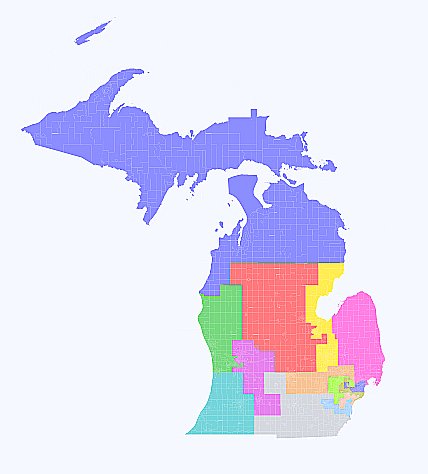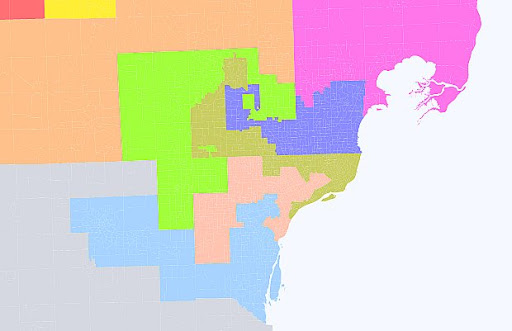Michigan Redistricting Maps
Redistricting: Hail To the Michigan GOP?


Here are brief district descriptions.
1. Benishek (R) Upper Peninsula, northern lower peninsula.
2. Huizinga (R) West Michigan coast, Walker, Grandville, Wyoming, Kentwood.
3. Amash (R) Kent excluding Grand Rapids suburbs, Ionia, Barry, Calhoun.
4. Camp (R) Central lower peninsula.
5. Kildee (D) Genesee, Saginaw area, west Tuscola, Bay, Arenac, Iosco.
6. Upton (R) Southwest Michigan.
7. Walberg (R) South-central Michigan.
8. Rogers (R) Livington, north Oakland, Ingham.
9. Levin (D) and Peters (D) south Macomb, Royal Oak, Bloomfield.
10. Miller (R) North Macomb, St. Clair, Huron, Sanilac, Lapeer, east Tuscola.
11. McCotter (R) Northwest Wayne, Southwest Oakland, Troy.
12. Dingell (D) Ann Arbor, Ypsilanti, Downriver, Dearborn.
13. Clarke (D) south, west Detroit, Redford, Westland, Romulus, Dearborn Heights.
14. Conyers (D) north Detroit, Grosse Pointes, Southfield, Oak Park, Farmington, Pontiac.
Republican Michigander has written more detailed district descriptions. He also compiled election results in the 2004 and 2008 presidential elections and a recent congressional election broken down by jurisdiction.
Congressional District 1 - Redistricted (MI-01)
Congressional District 2 - Redistricted (MI-02)
Congressional District 3 - Redistricted (MI-03)
Congressional District 4 - Redistricted (MI-04)
Congressional District 5 - Redistricted (MI-05)
Congressional District 6 - Redistricted (MI-06)
Congressional District 7 - Redistricted (MI-07)
Congressional District 8 - Redistricted (MI-08)
Congressional District 9 - Redistricting (MI-09)
Congressional District 10 - Redistricted (MI-10)
Congressional District 11 - Redistricted (MI-11)
Congressional District 12 - Redistricted (MI-12)
Congressional District 13 - Redistricted (MI-13)
Congressional District 14 - Redistricted (MI-14)
Here are more vote totals from 2008 and the average of the governor, secretary of state, and attorney general races from 2006. (via Ryan_in_SEPA at Red Racing Horses)
District (Color) McCain/Obama DRA Average (GOP/Democrat)
MI-1 (Navy Blue) 48.4/49.8 55/45
MI-2 (Dark Green) 50.3/48.1 63.4/36.6
MI-3 (Purple) 48.7/49.6 60.6/39.4
MI-4 (Red) 48.6/49.7 58/42
MI-5 (Yellow) 35.4/63 56.2/43.8
MI-6 (Teal) 45.2/53.1 56/44
MI-7 (Gray) 47.4/50.9 57.1/42.9
MI-8 (Brown) 46.6/52 59.7/40.3
MI-9 (Blue) 40.2/58 50/49.6
MI-10 (Pink) 50.1/48.1 60.1/39.9
MI-11 (Lime) 48.3/50.2 61.2/38.8
MI-12 (Light Blue) 31.4/66.9 42.3/57.7
MI-13 (Tan) 15.7/83.2 25.8/74.2
MI-14 (Olive) 18.5/80.8 70.6/29.4
Many observers have detailed the basic features of the map. Gary Peters' district is carved into four pieces. Most of the Republican districts get safer. Thad McCotter is the big winner, with his district getting about four points more Republican. All the other incumbents get about one point safer, except for Amash, who loses one point.
- Benishek adds the Grand Traverse area and loses areas north of Bay City
- Huizinga loses a couple northern counties and takes some Grand Rapids suburbs from Amash
- Amash takes Calhoun from Walberg
- Camp takes Clinton and south Schiawassee back from Rogers (he had them in the 90s)
- Upton adds north Allegan, a heavily Republican area
- Walberg loses Calhoun (including Mark Schauer's base) and takes Monroe from Dingell
- Rogers takes some of north Oakland from Peters
- Miller takes the majority of Tuscola from Kildee and loses a chunk of Sterling Heights
- McCotter loses Redford, Westland, and Van Buren and adds Waterford and Troy
The districts are all safe for their current incumbents.
Nonetheless, there are some issues that have either gone unremarked or misunderstood.
3. Some commenters have speculated that the legislature was trying to weaken Amash. I would have preferred that Huizinga take part of Grand Rapids rather than the suburbs. Nonetheless, this district is not vulnerable in the general election and is the second or third most Republican in Michigan.
Some have also speculated that they may have wanted to weaken Amash for a primary challenge by former secretary of state Terri Land. I would be very skeptical of this, as Amash has not voiced any complaints about the map. Of the area Amash lost, he did well in Wyoming, Walker, and Grandville in the primary. Kentwood was dominated by Bill Hardimann, who was mayor there before he was a state senator.
Calhoun County may have something of a reputation for moderation, but this is exaggerated. Much of this has to do with longtime state senator Joe Schwarz. But it has also voted for state reps Jerry VanderRoest and Jase Bolger, who are hardly moderates.
Nonetheless, Amash won almost all areas of the district over two credible primary opponents. The only way he would have a chance of losing a primary is if Right to Life didn't endorse him. Some folks were miffed when he voted present on defunding Planned Parenthood. (He supports defunding them but didn't like singling out an organization.) As long as Amash has the support of the Devos family, I can't see Right to Life abandoning him.
6. People keep saying that the sixth district would be vulnerable as an open seat. I don't agree. Their opinion seems to follow from Presidential election results. People don't realize that John McCain publicly pulled his campaign out of Michigan, which netted him the votes of some upset independents and joiners who wanted to be on the winning side.
While the sixth has occasionally gone democrat at the top of the ticket, this doesn't hold in downballot races. The district has all Republican state senators. Moreover this has been true for many decades, with term limits ensuring frequent turnovers. Only the Kalamazoo seat has been close, and it has still leaned Republican.
There is one solidly democrat state representative in Kalamazoo and seven Republicans. Again, it has stayed this way for many decades. Only two of the Republican districts have even had close races in 2008. Only one county commission has had a democrat majority (Kalamazoo, 2006-2010).
9. Commentators have discussed the options for Gary Peters. The consensus (which is correct) is that he would have no chance against Sander Levin. Actually, he might not have an easy time even if Levin retired. The new district 9 is based in south Macomb, which likes a particular type of democrat. Macomb democrats are white, blue collar, pro-union, pro-gun, and often pro-life. Peters doesn't fit the bill.
The other widely discussed option is running in McCotter's district. But this district has basically no democrat areas left. Peters would lose here.
Oddly the option that seems clearly the best shot for Peters does not seem to have been mentioned anywhere. He could run against John Conyers in the new 14th district. He would certainly take some flack for running in a black-majority district, but that hardly makes it unwinnable. Due to clever line-drawing, Conyers has only about 20% of his old constituents. Part of that black majority is Pontiac, which is currently in Peters' district. Southfield is full of middle-class blacks who fled Detroit, and probably wouldn't be thrilled with Conyers.
Conyers is 82 and hasn't had a remotely competitive race (primary or general) in decades. His wife Monica is in state prison for corruption when she was on the Detroit city council. I suspect that he may be vulnerable to a strong primary challenge.
11. Thad McCotter is currently running for president, and nobody seems quite sure why. The best guess I've heard is that he is hoping to get a talk show. People seem to think that McCotter will not run for reelection, though I don't know that this is certain.
If he doesn't the seat will be open. Some commenters assume that term-limited state rep. Marty Knollenberg is a shoo-in for the nomination. True, he is the son of Congressman Joe Knollenberg, who was defeated by Peters in 2008. But Knollenberg has had Republican detractors on both the left and the right. He was primaried by liberal Republican former state rep. Pat Godchaux in 2006. She got about 30%.
I would expect a tough fight for the nomination for this seat. A top candidate for conservatives and the Tea Party if he chose to run would be Senator Pat Colbeck of Canton.
Overall, I consider this map to be practically a work of genius. It is a very solid incumbent protection plan.
Previous articles on Michigan redistricting:
Michigan Redistricting: Two Possible Congressional Maps
Michigan Redistricting: Two Possible State Senate Maps
Michigan Redistricting: State House Part I: Wayne County
Michigan Redistricting: State House Part II: Oakland and Genesee
Michigan Redistricting: State House Part III: Macomb and the Thumb
Michigan Redistricting: State House Part IV: The Rest of the State
Michigan Redistricting: Analysis of Democrats State Senate Plan
Michigan Redistricting: Official Republican State Senate Map Released
Michigan Redistricting: Republican State Senate Map Passed
Michigan Redistricting: Republican State House Map Passed
Previous articles on Michigan redistricting:
Michigan Redistricting: Two Possible Congressional Maps
Michigan Redistricting: Two Possible State Senate Maps
Michigan Redistricting: State House Part I: Wayne County
Michigan Redistricting: State House Part II: Oakland and Genesee
Michigan Redistricting: State House Part III: Macomb and the Thumb
Michigan Redistricting: State House Part IV: The Rest of the State
Michigan Redistricting: Analysis of Democrats State Senate Plan
Michigan Redistricting: Official Republican State Senate Map Released
Michigan Redistricting: Republican State Senate Map Passed
Michigan Redistricting: Republican State House Map Passed
No comments:
Post a Comment